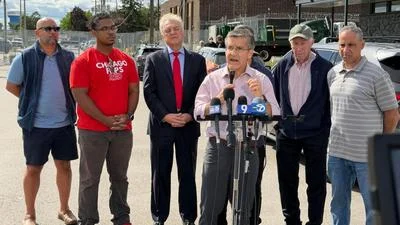The Illinois General Assembly held no hearings when it passed legislation this spring to vastly expand mail-in voting in the state. That’s right, no hearings were held on historic changes to the most important element of a democratic republic – the voting process. The legislation passed both houses on a nearly straight party line vote with Democrats supporting and Republicans opposing.
Troubles loom, though Illinois may be in better shape than many other states for the November 3 election. One thing certain is no final results in close races should be expected on election night, in Illinois or nationally.
The primary change Illinois made was vast expansion of vote by mail for this election. Anyone who cast a ballot in the past three years or who registered to vote or changed addresses after the March primary is being sent an application. Other eligible Illinoisans can request a mail ballot online.
That means mail-in votes will be far higher than ever before.
Illinoisans have already requested nearly1.5 million mail-in ballots. At that pace, over 25% of ballots cast probably will be by mail. That’s far higher than in recent elections. According to data we got from the Illinois State Board of Elections, mail-in ballots comprised just 9.3% of the total vote in the 2018 general election and just 9.1% in this year’s primary. In 2016, mail votes represented 6.5% of total votes in the general election.
In Illinois, mail in votes will be processed as they are received by county clerks, who are assigned that task. That’s why election officials prefer you send ballots in early. However, those will not be totaled until polls close at 7 P.M. on election night.
But that’s not the end. Illinoisans have until October 29 to request a mail-in ballot and have until November 3 to postmark their ballot, so election officials will be tabulating those until November 17, and final counts won’t come until after that date. How long that will take clerks is uncertain because the volume is uncertain.
That delay may be acceptable, but the bigger risk is litigation that could drag out close races. Suppose somebody finds a bag of ballots thrown in the garbage, or ballots are rejected because of a faulty postmark, or printed with an incorrect address, or bounced because the voter forgot to sign or signed too sloppily to match the signature on record, or any of many other potential problems. How hard will it be to find a political or activist judge in Illinois willing to intervene, especially when genuine voting rights are at issue?
The risk is there, but probably lower in Illinois than some other states. National stories abound about, as a Stanford election expert put it, Bush vs. Gore “on steroids,” a reference to the 2000 presidential race that ended up in the Supreme Court. Many other states have a worse deadline structure than Illinois. Voters in ten states don’t even have to request a mail-in ballot until November 2.
Litigation is already abundant. At least 300 lawsuits over voting and ballot procedures changed to address concerns about coronavirus have already been filed across 44 states, including seven in Illinois.
The Biden campaign alone has 600 lawyers geared up to litigate. Nationally, this may well be a fiasco unless the election is decided in a landslide.
Illinois law requires voters who submit an application for a mail-in ballot before Oct. 1 to get their ballot no later than Oct. 6. That means many will cast their votes even before two of the three the presidential debates, which are scheduled for October 15 and 22. Debates for many other offices will also come after many votes have been cast.
Then there’s the widely discussed issue of fraud and meddling. A common answer is that there’s “no evidence” of extensive fraud in voting by mail, but the problem is establishing the evidence either way. It’s just not easy to prove or disprove.
Unquestionably, the potential for fraud or meddling is there. The young person who checks granny’s mail once a week could easily fill out the ballot for her. The guy now residing in Indiana who had his application for an Illinois ballot sent to his residence might use it. A postal worker in an area that votes heavily in a way the worker doesn’t like could trash or delay a batch. Those would be felonies. Maybe they will be rare, and maybe both sides will do it, but who knows?
Illinois, believe it or not, is blessed with a good, nonpartisan oversight board – the Illinois Election Commission. It deserves credit for keeping the 2018 election mostly problem-free, despite extraordinary turnout. However, the General Assembly made the most important rules, not the Commission, and the Commission will have no control over litigation about those rules. And vote counting is for county clerks. Most are claiming they are prepared, but concerns linger.
Still, those rules are not as bad as some other states, and Biden is likely to win big in Illinois, so Illinois may be at less risk of turmoil than some other states.
And turmoil is definitely what the left is planning for, which you can see in the work of the Transition Integrity Project. It’s a large group that includes prominent Democrats and some Republicans opposed to Trump focused, purportedly, on assuring that Trump is prevented from trying to maintain power even after losing the election. They worked out, in detail, various scenarios based on different election outcomes.
But take a look at Game 3 that starts on page 17 of its report. It lays out the chaos they envision that might arise if Trump once again lost the popular vote but won the electoral college.
You’d think that would be the end of the game – Republicans would be happy and Democrats would accept the legal result, right? Somehow, however, they still envision lawsuits, riots and resistance, yet they say it’s Trump they fear. And there’s Hillary Clinton’s recent advice to Biden not to concede the election under any circumstances. Hmm.
*Mark Glennon is founder of Wirepoints.





 Alerts Sign-up
Alerts Sign-up